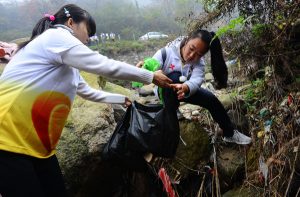Memo #266
By Lisa Hoffman – hoffmanl [at] uw.edu
 Indicative of an increased attention to volunteerism as a tool for cities and communities across the globe, in 2011 the United Nations issued its first State of the World’s Volunteerism Report, subtitled “Universal Values for Global Wellbeing.” Young people in particular have been encouraged by agencies like the UN, local governments, NGOs, their teachers, and in the case of China, the Party, to engage in volunteer activities. Thus, Volunteering may be understood both as an official policy and a community-led effort to address issues ranging from poverty to public health to the environment.
Indicative of an increased attention to volunteerism as a tool for cities and communities across the globe, in 2011 the United Nations issued its first State of the World’s Volunteerism Report, subtitled “Universal Values for Global Wellbeing.” Young people in particular have been encouraged by agencies like the UN, local governments, NGOs, their teachers, and in the case of China, the Party, to engage in volunteer activities. Thus, Volunteering may be understood both as an official policy and a community-led effort to address issues ranging from poverty to public health to the environment.
In China, volunteering is reflective of two important governmental shifts: the dismantling of the command economy along with its centralized distribution of welfare provisions, and the legalization of “non-governmental” organizations across a range of fields, including poverty relief. These recent shifts– expressions of decentralization–have led to urban experiments in poverty alleviation, a diversification in the delivery of social services, and the acceptance of more market-based and non-state actors and organizations, such as volunteers. Spaces that used to be dominated and organized by the state—such as poverty relief and education—are now inviting individuals to participate in new ways. Because these individuals are not necessarily familiar with those they are helping, this also means that volunteering establishes new kinds of (often cross-class) urban relationships between former “strangers.”
Typically, conversations about decentralization tend to focus on fiscal policies, tax levying, and the localization of election processes rather than on volunteer activities. They also tend to describe it as “less” state governance and “more” local autonomy. If we analyze volunteering as an aspect of decentralized modes of governing, however, we recognize that it is not simply about “localized” policies and rules, but is also a process that shapes and produces identities and personhood. Decentralization from an anthropological perspective, in other words, is a form of power that is shaping welfare provisioning in urban China and is in effect producing new urban subjects: volunteers.
About the Author:
Lisa Hoffman was trained as a cultural anthropologist and is Associate Professor of Urban Studies at the University of Washington Tacoma.

In Xi’an, university students volunteer to clean up trash in a campaign to beautify the Qinling Mountains (Source: China Daily)
Links:
- Lisa Hoffman, “Decentralization as a Mode of Governing the Urban in China: Reforms in Welfare Provisioning and the Rise of Volunteerism,” Pacific Affairs (Special Issue on Decentralization in Asia), December 2013
Related Memos:
See our other memos on China.
Comments are closed, but trackbacks and pingbacks are open.